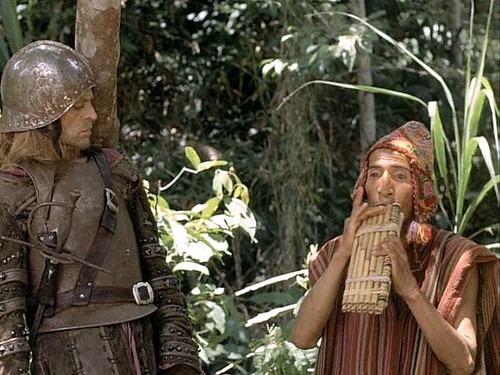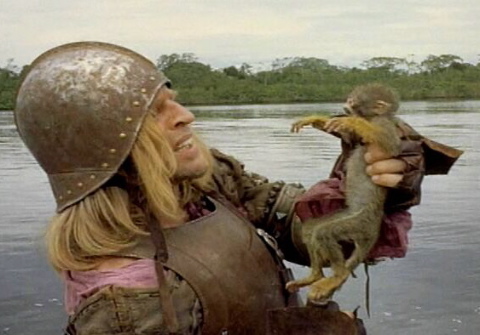
Extraordinary and epic. Man pursues glory, power, wealth, greatness. Man versus nature. Nature wins.
Klaus Kinski, as Aguirre, is a Spanish soldier of many who have set out with Pizzaro from Peru to search down the Amazon river for El Dorado, the fictitious city of gold. He undermines the royalty who begin in command. He sets up a puppet government with an emperor, and then kills him off. He begins as a hostile sociopath, and becomes a megalomaniac convinced of his great destiny and buoyed by his feverish mind and power over men's destinies that he declares himself, "The Wrath of God".
God certainly unleashes her/his wrath upon this group of conquistadors. Through simple attrition, Aquirre is the last man standing. His force of will propelling him on, even though his pathetic, sinking raft of death is covered with wily, tiny, swarms of monkeys.

In his final monologue, and I'm not giving anything away to say that no one ever found El Dorado, Aguirre declares that he will put on history like a play. He will be god, writing the destinies of all, controlling fate. It is not just greed for gold, but rather what that gold can bring: a delicate beauty, a mighty army, a great empire. The tales of others' successes, particularly Cortez in Mexico, have fueled his desire to be a great man who can mold the new earth he has "discovered".
All of this enormous power struggle is set amongst the beautiful forests of the Amazon. We begin in the groups' final decent down from the mountains and into the forest. It's incredible how totally impractical these people were. Two women accompany the soldiers and their Incan/Quechua slaves. They are carried by four men in large covered chairs above the earth. The group has brought along several horses and a canon. I can't imagine how it is possible to get a canon, even in pieces, over the Andes mountains along precariously narrow trails.
As the end nears, the survivors become delirious with fever and starvation, and the film takes on what I can only describe as a Terrence Malick style. I haven't seen Malick's first film, but Badlands came out a year after Aguirre and I wonder if there was something in the air in the early 70s. The jungle takes on a magical quality. One of the women just walks away, in her golden gown, into the trees, vanishing without a trace.
The most eerie moment, aside from the end with the monkeys, is the abandonment of a horse. The horse had endangered the poorly constructed raft and so the "emperor" decides that it must be tossed overboard, still wearing its military style hood. The horse swims to the bank and stands in the trees and brush watching the raft slide away. The white loops rimming the horses eyes follow the crew. Aguirre looks back and I felt an unusual sensation of surreal regret.
It's a great journey and its punctuated by mysterious moments and intriguing character conflicts.

I wonder in what ways we may be like the conquistadors. How do we mold others' realities and lives to fit our expectations? How are we impractical and yet blind? How much do I desire to write the script of my life? Can I stop feeling the need to be a great person in history? Some feel the need to achieve fame, but I think many parents try to instill a desire for greatness in their children so that they will try, work hard and achieve some kind of success. But in young minds it often gets carried away. Do I have real, practical goals or are they too deeply rooted in a desire for greatness?
A very very good movie. It is after all, directed by Werner Hertzog. Ah, Werner...